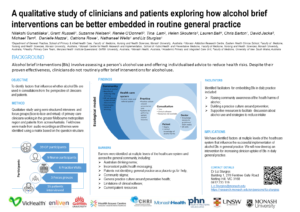 This poster was presented at the AAAPC Annual Research Conference 2020, held online on 14-15 August 2020.
This poster was presented at the AAAPC Annual Research Conference 2020, held online on 14-15 August 2020.
[Abstract (PDF) : Poster (PNG)]
Gunatillaka N, Russell G, Nielsen S, O’Donnell R, Lam T, Skouteris H, Ball L, Barton C, Jacka D, Tam M, Mazza D, Rowe C, Wells N, Sturgiss L. A qualitative study of clinicians and patients exploring how alcohol brief interventions can be better embedded in routine general practice [poster]. Australasian Association for Academic Primary Care Annual Research Conference 2020. Held online. 2020 August 14-15.
Abstract
Title
A qualitative study of clinicians and patients exploring how alcohol brief interventions can be better embedded in routine general practice.
Background
Alcohol brief interventions (BIs) involve assessing a person’s alcohol use and offering individualised advice to reduce health risks. Yet, despite their proven effectiveness, clinicians do not routinely offer brief interventions for alcohol use in daily practice.
Objective
To identify factors that influence whether alcohol BIs are used in consultations from the perspective of clinicians and patients.
Methods
Qualitative study using semi-structured interviews and focus groups (face-to-face and virtual) of primary care clinicians working in the greater Melbourne metropolitan region and patients from across Australia. Field notes were made from audio-recordings and themes were identified using a matrix based on the question structure.
Findings
39 GPs, nine practice nurses and 16 patients participated. Barriers were identified at multiple levels of the healthcare system and across the general community including: Australian drinking norms; inconsistent public health messaging around alcohol harm; patients not identifying general practice as a place to go for help; community stigma; general practice culture around preventive health; limitations of clinical software and current patient resources. Identified facilitators for embedding BIs in daily practice included: (1) raising community awareness of the health harms of alcohol, (2) building a practice culture around prevention and, (3) supportive resources to facilitate discussion about alcohol use and strategies to reduce intake.
Implications
We have identified factors at multiple levels of the healthcare system that influence the successful implementation of alcohol BIs in general practice. We will now develop an intervention for increasing clinician uptake of BIs in daily general practice.
